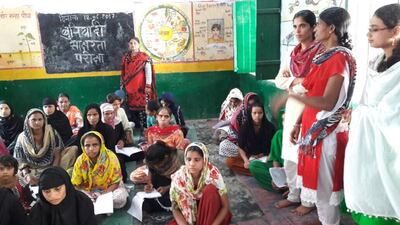Thirty-five women who have never been to school have passed a literacy test in a northern Indian village after attending classes organised by a Sharjah resident in her home country.
Aged 15 to 38, the women are the first from Badagaon village to pass a basic written test after they spent three years learning to read, write and count in the homes of local teachers in India's most populous Uttar Pradesh state, which also has one of the country’s lowest literacy rates.
Launched by financial consultant Shazia Kidwai, the project supports illiterate women who would otherwise care for their children, tend to their homes, do farm work and weave cotton scarves for daily wages.
Grandmother of three and mother of four, Anees Banu, said she always thought being educated came with an age tag but will now make sure her grandchildren study.
“I used to call the neighbour’s children to dial a number since I could not read. I could not sign so I put my thumbprint on papers. Now I can read directions and don’t need to ask anyone anymore. I thought there was an age to learn but I learnt from Shazia appi (elder sister) that you study when you want,” the 38-year-old said.
Like most women in the village, Ms Banu was married much before she turned 15-years-old and her two daughters were married aged 16.
According to Indian law, a woman is not allowed to marry before turning 18 and a man not before 21. However, underage marriage is still commonplace in many villages.
Sharjah resident Shazia Kidwai said education has sparked a change in mentality.
“Earlier the girls got married to anyone, some men were illiterate. With some education, they are voicing their opinions, they want to study and want the man they marry to be educated,” Ms Kidwai said.
The two-hour classes are held daily in the homes of local teachers.
In the conservative rural society, boys attend school but girls are rarely allowed to venture alone beyond their community of about 30 homes.
These are long-held orthodox views that Ms Kidwai said she is taking on.
“I’m hoping they gradually understand what education can bring. My motive is not to get them to graduate or go to college, which one or two may manage, it’s to change the mentality of people. The literacy certificate is a tool in their hands to show proof that this can change their future,” she said.
The women completed a three-hour state literacy test last month in about an hour. They were asked to match words, construct sentences, fill in the blanks with simple Hindi words, add and subtract two-digit numbers and tested on multiplication tables up to 10.
Shabana Khan, 30, felt proud when she was able to answer most of the 15 questions.
“I feel I had achieved a lot. I also got my children admitted to school on my own. I knew what to ask and how to sign papers so I did not need anyone’s help. When I first came to the classes, I didn’t understand what it could do for me.”
Learning is crucial for 25-year-old Safia Rafiq Mulla who has four sisters, of whom three are married.
“When we are given money for work, we accepted it. We did not know how to keep accounts or add numbers. Now no one can trick us,” said Ms Mulla, who is paid 25 rupees (Dh1.4) for weaving 25 cotton scarves.
“Shazia appi told us to read newspapers and magazines. I see TV and read the newspaper. I have decided I want to study even after I marry. I will never leave studies.”


![[Missing Caption]](https://www.thenationalnews.com/resizer/v2/OOPVCZYO4LT3YRHCPOUUUHHOGQ.jpg?smart=true&auth=645286eb69e59a1db6f972a1d1b24f74746578709ac814bfcb6395a7959323a7&width=400&height=300)
